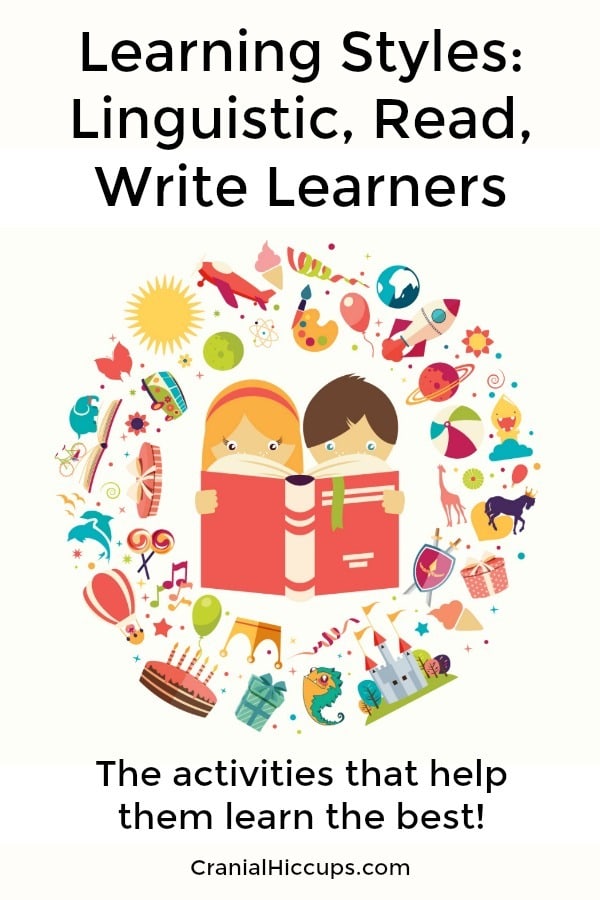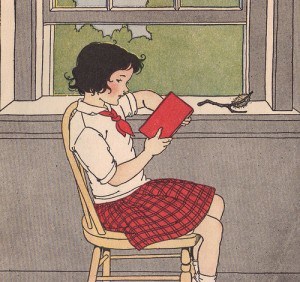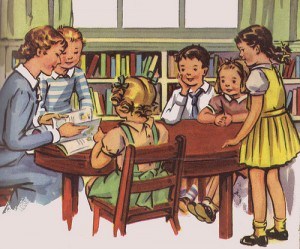
I think that linguistic learners have it the easiest in that our world deals with words – whether in speaking, reading, or writing. Because of this many linguistic learners are considered to be the ‘gifted’ ones because they do so well in this environment. Hopefully in this journey through each of the multiple intelligences we’ll come to learn that other ‘intelligences’ can also be ‘gifted’ especially when given the chance to learn in a way that is best for them. They just need to be given those tools.

My oldest is a lot like I am, at least with her learning styles/multiple intelligences. We both LOVE to read and can learn anything through reading. We enjoy word games, writing, book groups, dictionaries, the history of a word and its meaning, etc. One thing that IS different between us is I disliked English in school. I didn’t like that my writing grade was really up to the interpretation of the teacher. I much rather preferred the set-in-stone, follow-the-rules, only-one-right-answer of math.
Linguistic learners are known for their good recall of dates, places, names and other trivia. They have an inherent natural ability for spelling words correctly. They have a great vocabulary for their age and enjoy puns, tongue twisters, and word games.
I remember teaching my oldest how to play Scrabble when she was about six. I couldn’t get anyone else to ever play with me so I decided I’d teach her how. I figured as she got older she’d get better and better and our games would become more intense and enjoyable to play. At age eight she got her first 50 point bonus. She used all of her letter tiles to spell “glittery” using the ‘t’ off another word. I was probably more excited than she was! The time of having a good Scrabble match was closer than I thought!
The types of activities linguistic learners enjoy the most are:
- word games
- sharing time
- storytelling, speeches, reading to class
- lectures, debates
- large- and small-group discussions
- books, worksheets, manuals
- brainstorming
- writing activities
- publishing (e.g., creating class newspapers)
- audio books
- choral reading
- individualized reading
- memorizing linguistic facts
- extemporaneous speaking
- journal keeping
- typing

As you have probably guessed, the majority of public school teaching is geared towards those who are linguistic (and mathematical/logical). With textbooks, lectures, worksheets, etc. linguistic children thrive in that type of environment. I LOVED school! I cried when school was out for the summer. I looked forward to getting (and smelling) the new books each year.
My husband is not a linguistic learner. He had trouble learning how to read, couldn’t (and still can’t) spell very well and basically went through school thinking he was stupid and dumb because he just couldn’t/didn’t learn well in that environment. He cried when it was time for school to start again. He plain hated school! Now that he knows how he learns and what his multiple intelligences are he has made great strides in teaching himself things he never thought he’d be able to understand or learn.
Having said all that, I know a lot of public schools have come a long way from when I was little in changing their teaching approaches to accommodate more learning styles, especially in the younger grades.
Links to the other learning intelligences are at the bottom of this post.
Thank you for this post. My two daughters and I are linguistic learners. We all did well in school. My daughters both married men who hated school, struggled with reading and writing. But both men are extremely intelligent, can build or fix anything. They are also the most loving and attentive husbands and fathers. My younger daughter has been able to help her husband graduate from community college, and he is now a licensed electrician. He now knows he is smart, he can support his family, he has self respect that he never had before.